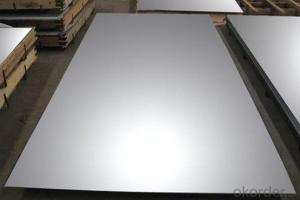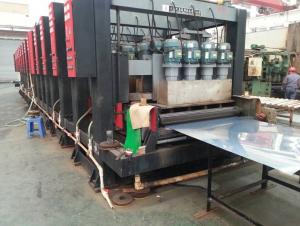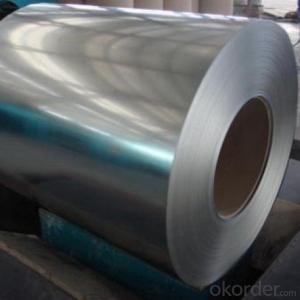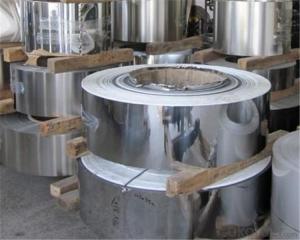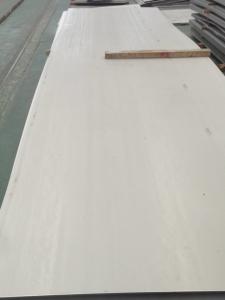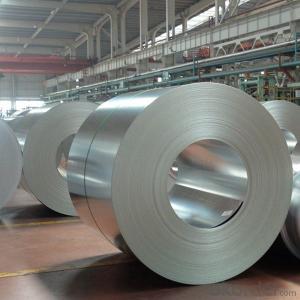304 Stainless Steel Sheet
- Loading Port:
- Shanghai
- Payment Terms:
- TT OR LC
- Min Order Qty:
- 1 kg
- Supply Capability:
- 42000 kg/month
OKorder Service Pledge
OKorder Financial Service
You Might Also Like
1.Descripiton:
304 Stainless steel plate with high surface finish, high plasticity, toughness and mechanical strength, acid, alkali gas, solution and other corrosive media. It is a kind of alloy steel not easy to rust, but it is not absolutely not rusty.
According to the method of divided into two kinds of hot rolling and cold rolling, and according to the characteristics of the steel group is divided into five categories: Austenitic, austenitic iron body, iron body, martensitic, precipitation hardening type. Can withstand the corrosion of oxalic acid, sulfuric acid and ferric sulfate, nitric acid, nitric acid and hydrofluoric acid, copper sulfate sulfuric acid, phosphoric acid, formic acid, acetic acid, etc. all kinds of acid, widely used in chemical, food, medicine, paper making, petroleum, nuclear energy and other industries, as well as the construction, kitchen utensils, cutlery, vehicles, household appliances, all kinds of spare parts requirements.
2.Product characteristic:
304 stainless steel plate surface appearance and the use of the possibility of diversification
Good corrosion resistance, durable than ordinary steel
304 stainless steel plate corrosion resistance is good
High strength, and thus the possibility of using thin plate
High temperature resistance and high strength, so can fire resistance
Normal temperature processing, that is easy to plastic processing
Because no surface treatment, so simple, simple maintenance
Clean, clean and high
Good welding performance
3.Specification:
Stainless steel plate according to the system method of hot rolling and cold rolling of the two, including the thickness of 0.02-4 mm and 4.5-100 mm thick plate.
4.Reference picture
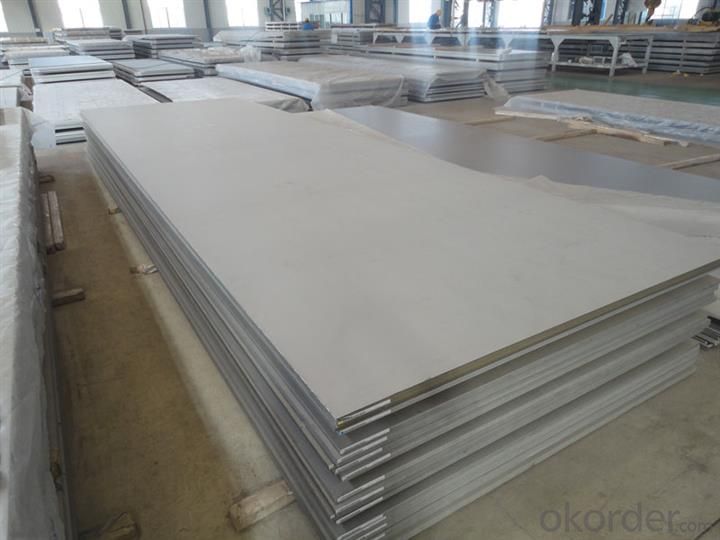
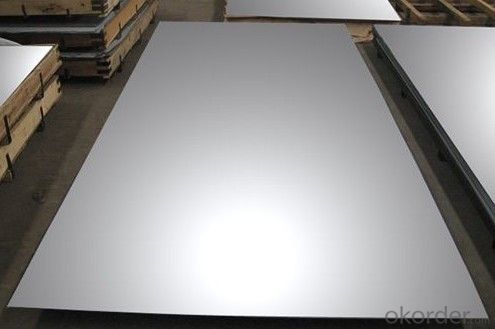
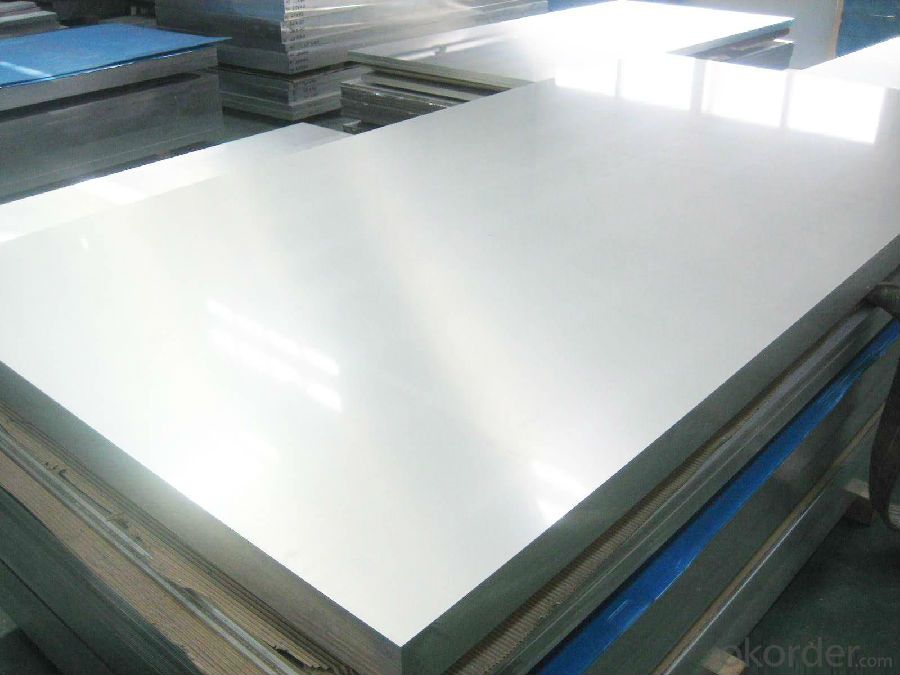
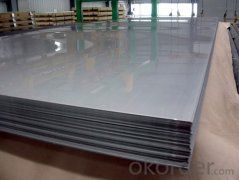
- Q: How are steel coils priced in the market?
- Steel coils are typically priced in the market based on factors such as the current demand and supply dynamics, the quality and grade of the steel, the production and transportation costs, and any additional charges or taxes. The pricing can also be influenced by global economic trends, trade policies, and currency fluctuations.
- Q: What are the different types of steel coil surface coatings?
- There are several different types of steel coil surface coatings, including galvanized steel coatings, aluminized steel coatings, and organic coatings.
- Q: What are the different types of steel coil loading and unloading methods?
- There are various methods for loading and unloading steel coils, including overhead crane systems, coil lifters, coil hooks, C-hooks, coil tippers, and coil carriages. Each method is suited for different coil sizes, weights, and handling requirements.
- Q: Im going to buy T-304 Stainless Steel exhaust tips for my truck. Is T-304 Stainless Steel good metal?
- Surprisingly any stainless steel is considered soft or tough metal. A hardness tester will bare this out. It resists work hardening which means you can bend it many more times than cold rolled or hot rolled steel before it will break. Your choice is a good one for your intended purpose.
- Q: What are the common applications of pre-painted galvanized steel coils?
- Pre-painted galvanized steel coils are extensively utilized across various industries due to their wide range of applications. These coils find common usage in the construction industry for roofing, wall cladding, and structural components. Their coating provides exceptional corrosion resistance and durability, making them suitable for both residential and commercial buildings. The automotive industry also heavily relies on these coils for manufacturing body panels, interior trims, and underbody protection. The pre-painted coating not only enhances the aesthetic appeal of vehicles but also provides protection against rust and corrosion. In the production of home appliances, such as refrigerators, ovens, washing machines, and air conditioners, pre-painted galvanized steel coils are commonly employed. The smooth and durable coating ensures a long-lasting and visually appealing finish for these appliances. The furniture industry also benefits from using pre-painted galvanized steel coils, which are used for manufacturing cabinets, shelves, and other furniture components. The coating on these coils adds a decorative element while offering protection against scratches and wear. In the electrical and electronics industry, pre-painted galvanized steel coils are utilized for manufacturing switchboards, control panels, and enclosures. The pre-painted coating provides insulation and protection against electrical hazards, making them suitable for such applications. In the agricultural sector, these coils are used for manufacturing equipment like grain silos, livestock shelters, and poultry houses. The corrosion-resistant coating ensures the durability and longevity of these agricultural structures. The vibrant and visually appealing colors of pre-painted galvanized steel coils make them a popular choice for signage and advertisement boards. The coated surface provides a smooth and glossy finish that enhances the visibility and attractiveness of the signage. To summarize, pre-painted galvanized steel coils offer excellent corrosion resistance, durability, and aesthetic appeal, making them suitable for a wide range of industries and applications, including construction, automotive, appliances, furniture, electrical and electronics, agricultural equipment, and signage and advertisement.
- Q: I believe steel is stronger but it steel lighter than iron too?
- Steel is iron, with other things added that strengthen it and/or make it less rust liable. So, in general, steel is stronger than iron. In so far as the density, that depends on the steel alloy. Some are higher than iron, some lower. Remember there are hundreds of different steel alloys. edit: but the density is still close to that of iron. density steel 7750 to 8050 kg/m? density iron 7870 kg/m?
- Q: How are steel coils used in the production of doors and windows?
- Steel coils are used in the production of doors and windows as they provide the raw material for manufacturing the frames and components. The coils are processed and shaped into the desired profiles, which are then used to construct the frames, sashes, and other structural elements of doors and windows. This ensures strength, durability, and stability in the final products.
- Q: How do steel coils affect the quality of finished products?
- The quality of finished products in various industries can be greatly influenced by steel coils. Dimensional accuracy and consistency are key factors that determine the impact of steel coils on product quality. When steel coils are not properly manufactured or have irregular dimensions, it can cause issues in the production process and result in finished products that do not meet the desired specifications. Moreover, the final appearance and performance of finished products are heavily dependent on the surface quality of steel coils. Defects such as scratches, rust, or unevenness in the coils can have a negative impact on the aesthetic appeal of the products, making them less desirable to customers. Additionally, these defects can compromise the functionality and durability of the finished products, potentially leading to failures or a reduced lifespan. The mechanical properties of steel coils also play a crucial role in determining the quality of finished products. Coils with inconsistent or inadequate mechanical properties can compromise the strength, toughness, and overall performance of the end products. This is especially important in industries like automotive or construction, where strength and reliability are of utmost importance. The use of steel coils with incorrect mechanical properties can lead to safety hazards or structural failures. Furthermore, the chemical composition of steel coils can have a significant impact on the quality of finished products. The presence of impurities or variations in the alloying elements can affect the material's corrosion resistance, weldability, and other important properties. This, in turn, can affect the longevity and functionality of the final products. In conclusion, steel coils have a significant influence on the quality of finished products. Their dimensional accuracy, surface quality, mechanical properties, and chemical composition all contribute to the overall performance, appearance, and durability of the end products. Therefore, it is essential to ensure that steel coils used in manufacturing processes meet the required standards to achieve high-quality finished products.
- Q: What is steel made of and what is its molecular weight? It's for a project in chemistry class so if you have a website link as well, that would be great!
- Steel is an alloy consisting mostly of iron with a little Carbon thrown in. Steel is not a molecule, therefore, it does not have a molecular weight. Steel contains atoms of iron and carbon in a crystal lattice, along with various other alloying elements such as manganese, chromium, vanadium, and tungsten.
- Q: What are the common methods of welding steel coils?
- The common methods of welding steel coils include shielded metal arc welding (SMAW), gas metal arc welding (GMAW), flux-cored arc welding (FCAW), and submerged arc welding (SAW).
Send your message to us
304 Stainless Steel Sheet
- Loading Port:
- Shanghai
- Payment Terms:
- TT OR LC
- Min Order Qty:
- 1 kg
- Supply Capability:
- 42000 kg/month
OKorder Service Pledge
OKorder Financial Service
Similar products
Hot products
Hot Searches
Related keywords
